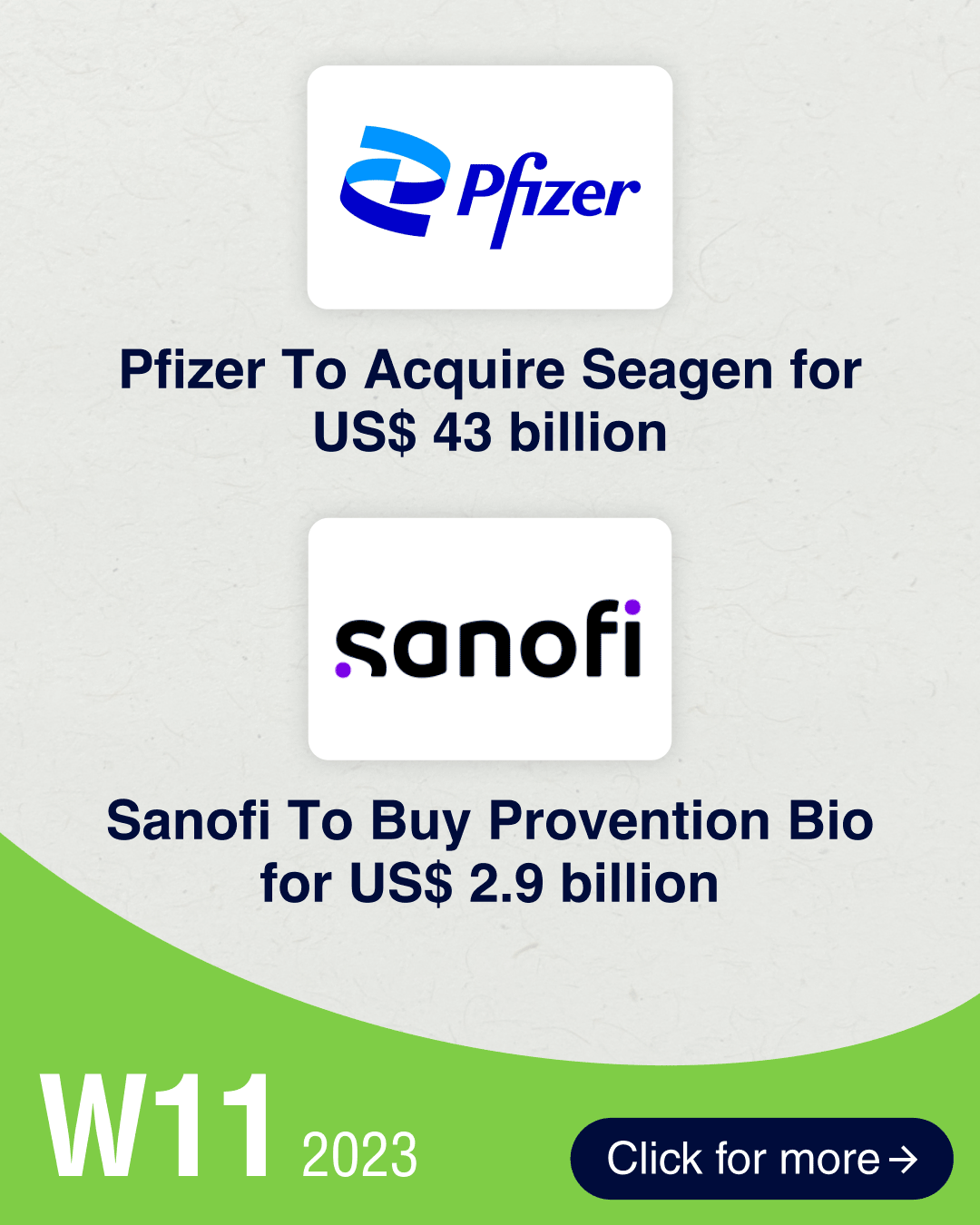
By PharmaCompass
2023-03-16
Impressions: 1,720
Biotech M&As picked up this week as Pfizer announced the acquisition of cancer treatment expert Seagen for US$ 43 billion and Sanofi said it will acquire Provention Bio for US$ 2.9 billion.
In approvals, Pfizer’s nasal spray for migraine – Zavzpret (zavegepant) – has been approved by the US Food and Drug Administration (FDA) as an acute treatment for adults. And Acadia Pharmaceuticals’ Daybue (trofinetide) has become the first drug to be approved by the FDA for the treatment of Rett’s syndrome (a rare disorder) in adult and pediatric patients two years and above.
The US Centers for Medicare and Medicaid Services (CMS) has unveiled the draft Medicare drug price negotiation guidance.
After Eli Lilly, its rival Novo Nordisk has also said it will reduce the US list prices of several insulin products by up to 75 percent next year. Novartis is planning to sell some of its ophthalmology assets to streamline its portfolio and concentrate on growth areas. And GSK has reported positive results from a phase 3 study of its experimental meningococcal combination vaccine.
Meanwhile, FDA has put a clinical hold on Mersana Therapeutics’ early-stage trial of its experimental cancer drug XMT-2056 following the death of a study patient. And Moderna is planning to hire around 2,000 employees globally by the end of this year and establish two new offices in south San Francisco and Seattle.
Pfizer to buy cancer drugmaker Seagen for US$ 43 billion to bolster oncology portfolio
Announcing its biggest deal in recent years, cash-rich Pfizer said it is acquiring cancer treatment specialist Seagen for US$ 43 billion. Seagen is a pioneer of antibody-drug conjugates, or drugs that work like “guided missiles” to destroy cancer cells while sparing healthy cells.
The deal is part of Pfizer’s move to mitigate a hit in revenues from declining sales of its Covid-19 products and patent expirations of some of its top drugs in the coming years. The deal will add four approved cancer therapies with combined sales of nearly US$ 2 billion in 2022 to Pfizer’s oncology portfolio that already boasts of 24 approved therapies.
Sanofi acquires Provention Bio for US$ 2.9 billion; gets type 1 diabetes med Tzield
Sanofi has announced that it is acquiring US-based Provention Bio for US$ 2.9 billion. The deal builds on an existing co-promotion agreement between the two companies, with the French pharma gaining full ownership of Provention Bio’s type 1 diabetes therapy Tzield. It is the first drug to be approved in the US to delay the onset of stage 3 type 1 diabetes in adults and pediatric patients aged eight years and older who are in stage 2 of the disease.
Novo to slash US prices of its insulin therapies next year: After Eli Lilly decided to reduce the US list prices of its most commonly prescribed insulin products earlier this month, rival Novo Nordisk has followed suit. The Danish drugmaker has said it will reduce the US list prices of several insulin products by up to 75 percent next year.
Pfizer’s US$ 11.6 billion Biohaven buyout pays off as migraine spray bags FDA nod
Pfizer’s nasal spray for migraine – Zavzpret (zavegepant) – has been approved by the FDA as an acute treatment for adults. Pfizer had acquired the drug along with oral migraine pill Nurtec ODT through its purchase of Biohaven Pharmaceutical for US$ 11.6 billion last year.
Zavzpret’s approval was based on a late-stage study where it was found to be superior to placebo in 13 of 17 goals, including pain relief in 15 minutes. Zavzpret will compete with rival treatments from AbbVie, Eli Lilly, Amgen and Teva.
First FDA-approved drug for Rett’s syndrome: Acadia Pharmaceuticals’ Daybue (trofinetide) has become the first drug to be approved by the FDA for the treatment of Rett's syndrome in adult and pediatric patients two years and above. Rett’s syndrome is a rare genetic neurological disorder that impairs a person’s ability to walk, speak, eat and even breathe easily.
CMS unveils first Medicare drug price negotiation guidance draft
The US Centers for Medicare and Medicaid Services (CMS) has given an early look into how it plans to negotiate Medicare Part D drug prices in 2026 through an initial draft. It has said it will select the 10 costliest prescription medicines under the Medicare program for negotiating price cuts. The selection will be based on gross spending and will go into effect in 2026.
The program, established under the Inflation Reduction Act of 2022, will allow Medicare to negotiate prices for the most expensive prescription drugs for the first time. The first 10 drugs for negotiation will be announced on September 1, and negotiations will begin in February 2024.
Imposes penalties on 27 drugs for higher than inflation price hikes: CMS has published a list of 27 drugs that will be subject to inflation penalties under the Inflation Reduction Act, because their drugmakers increased the prices of these medicines at a rate higher than inflation in the last quarter. Drugmakers will have to pay the difference to Medicare. AbbVie’s immunology drug Humira, Gilead’s cancer therapy Yescarta and Seagen’s cancer therapy Padcev figure in the list.
Novartis to sell some ophthalmology drugs to streamline its portfolio
Novartis is planning to sell some of its ophthalmology assets to streamline its portfolio and concentrate on growth areas. The Swiss drugmaker is working with an adviser to gauge interest for its front-of-eye treatments, including dry-eye drug Xiidra, which generated US$ 487 million in sales last year. The drugmaker had bought Xiidra from Teva for US$ 3.4 billion in 2019.
GSK’s meningococcal jab shows positive results: GSK has reported positive results from a phase 3 study of its experimental meningococcal combination vaccine, which is administered in two doses six months apart to healthy people aged 10-25 years. The vaccine – MenABCWY – has been found to be equivalent to GSK’s existing vaccines, Bexsero and Menveo. GSK said it will file for a regulatory nod in the US, Europe and other countries later this year.
And Merck’s blockbuster immunotherapy drug Keytruda, in combination with chemotherapy, has significantly improved overall survival of patients with unresectable malignant pleural mesothelioma (a rapidly progressing cancer that develops in the lining of the lungs) in a phase 2/3 study. If approved as a first-line treatment, Keytruda will challenge BMS’ Opdivo and Yervoy combination therapy in this indication.
FDA places clinical hold on Mersana’s cancer trial after patient death
The FDA has put a clinical hold on Mersana Therapeutics’ early-stage trial of its experimental cancer drug XMT-2056 following the death of a study patient. The Massachusetts-based company said it had voluntarily suspended the study on advanced or recurrent solid tumors expressing HER2 following the incident. The news is a setback for GSK, which had paid US$ 100 million cash last August to co-develop and commercialize the drug candidate.
Moderna to hire 2,000 employees, open two new offices in US
Moderna is planning to hire around 2,000 employees globally by the end of this year and establish two new offices in south San Francisco and Seattle. Moderna is also planning to open a new research and manufacturing site in the UK.The PharmaCompass Newsletter – Sign Up, Stay Ahead
Feedback, help us to improve. Click here
Image Credit : Phisper Infographic by PharmaCompass license under CC BY 2.0
“ The article is based on the information available in public and which the author believes to be true. The author is not disseminating any information, which the author believes or knows, is confidential or in conflict with the privacy of any person. The views expressed or information supplied through this article is mere opinion and observation of the author. The author does not intend to defame, insult or, cause loss or damage to anyone, in any manner, through this article.”







